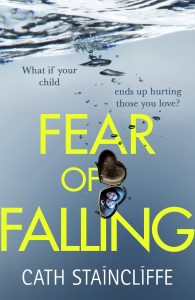Fear of Falling is published this month and I’m posting the Afterword from it here as it describes where the impetus to write the book came from.
 Adoption is often thought of as a fairy story, a happy-ever-after for those concerned. But at the heart of every adoption is loss, the loss of family and identity and legacy for the child, the loss of a child for the birth-parents, the loss of the possibility of having a biological child for most adoptive parents who come to adoption because of infertility.
Adoption is often thought of as a fairy story, a happy-ever-after for those concerned. But at the heart of every adoption is loss, the loss of family and identity and legacy for the child, the loss of a child for the birth-parents, the loss of the possibility of having a biological child for most adoptive parents who come to adoption because of infertility.
I was one of half a million babies adopted in the 1950s, 1960s and 1970s in the UK. The majority of us were adopted because our mothers were unmarried at a time when both Church and state punished such women for transgressing, deeming them morally depraved and unfit to be mothers. There was social stigma and shame attached to being pregnant and unwed, and huge pressure on women to give up their babies. I’ve been fortunate enough to have a successful reunion with my birth-mother and to form strong relationships with her and my seven birth-siblings. My adoptive parents met my birth-mother, brothers and sisters and that was a hugely positive experience. Reunion alongside counselling helped me heal emotionally, and my birth-mother said the same. An important part of that whole process was to acknowledge the grief, insecurity, guilt, even the anger that came with being adopted.
Thankfully, times have changed. Nowadays women have more control over their lives and more choices about contraception, reproduction and sexuality. Families come in all shapes and sizes. Few babies are relinquished for adoption. In this century people who adopt are more likely to be creating a family with a child who has been taken into care, a child who has had a damaging start to life. Friends and acquaintances of mine have adopted and some have encountered serious difficulties with the behaviour of their children, especially as they reach adolescence. Barely any of those families, or the ones I’ve read and heard about, have been able to get access to the sort of support they needed when they needed it. A survey carried out by BBC Radio 4’s File on 4 programme and Adoption UK in 2017 found that more than a quarter of adoptive families were struggling, facing challenges so serious that the adoption was at risk of disruption. It’s not an issue that is widely aired ‒ it’s almost taboo. What is heartening is that nine out of ten respondents were still glad they had adopted. And adoption does work for the majority. But the most vulnerable children in our communities need unstinting assistance, and their families deserve backing to the hilt with resources putting in place for those who require it. Our adoptive parents may give us all the love in the world but sometimes love is not enough.